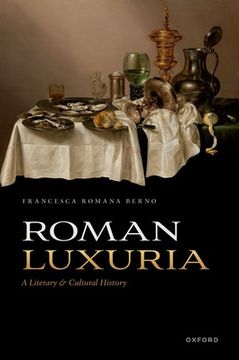Compartir
Roman Luxuria: A Literary and Cultural History (en Inglés)
Francesca Romana Berno
(Autor)
·
Oxford University Press, USA
· Tapa Dura
Roman Luxuria: A Literary and Cultural History (en Inglés) - Berno, Francesca Romana
$ 146.177
$ 243.628
Ahorras: $ 97.451
Elige la lista en la que quieres agregar tu producto o crea una nueva lista
✓ Producto agregado correctamente a la lista de deseos.
Ir a Mis Listas
Origen: Estados Unidos
(Costos de importación incluídos en el precio)
Se enviará desde nuestra bodega entre el
Miércoles 24 de Julio y el
Viernes 02 de Agosto.
Lo recibirás en cualquier lugar de Argentina entre 1 y 3 días hábiles luego del envío.
Reseña del libro "Roman Luxuria: A Literary and Cultural History (en Inglés)"
In classical Latin, luxuria means 'desire for luxury'; it is linked with the ideas of excess and deviation from a standard. It is in most cases labelled as a vice which contrasts with the innate frugal nature of the Romans. Latin authors do not see it as endemic but as an import from the East in the aftermath of military conquests--and as a cause of fatal decline. Following these etymological and semantic origins, Roman Luxuria: A Literary and Cultural History discusses the influence of Greek culture on the Roman concept and the peculiar characteristics of Roman luxuria. It analyses Roman views on luxuria through close readings in historical order from Cato the Elder, who regards luxuria as the opposite of the ideal Roman way of life, to the Christian poet Prudentius, who represents it in an allegorical fight with Sobriety. The book attends both to key authors and to wider literary genres, such as historiography and satire. Particular consideration is given to the rhetorical device of personification, which can be traced from the first appearances of luxuria in Latin literature to those of late antiquity. Berno devotes detailed attention to Seneca the Younger, whose work is often preoccupied with this passion. Seneca both defends himself from the charge of luxuria and violently attacks it in others, describing it as the archenemy of a philosophical life. Along the centuries, the focus on luxuria shifts from the economic sphere (and the waste of money) to the erotic, to the extent that in the Christian world it becomes one of the Seven Capital Sins representing the vice of lust.
- 0% (0)
- 0% (0)
- 0% (0)
- 0% (0)
- 0% (0)
Todos los libros de nuestro catálogo son Originales.
El libro está escrito en Inglés.
La encuadernación de esta edición es Tapa Dura.
✓ Producto agregado correctamente al carro, Ir a Pagar.

